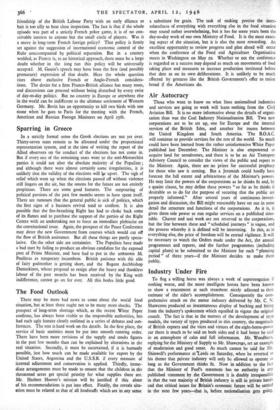Air Autocracy
Those who want to know on what lines nationalised industries and services are going to work will learn nothing from the Civil Aviation Bill. It is no more informative about the details of organi- sation than was the Coal Industry Nationalisation Bill. Two new corporations are to be set up, one for Europe and the internal services of the British Isles, and another for routes between the United Kingdom and South America. The B.O.A.C. will continue to provide services for the rest of the world.. So much could have been learned from the rather uninformative White Paper published last December. The Minister is also empowered to acquire land for aerodromes, and there is to be an Air Transport Advisory Council to consider the views of the public and report to the Minister. Again, there are no prizes for successful prophecy for those who saw it coming. But a Jeremiah could hardly have forecast the full extent and arbitrariness of the Minister's powers. He may limit the powers of the corporations as he thinks fit and, by a quaint clause, he may define these powers " so far as he thinks it desirable so to do for the purpose of securing that the public are properly informed." After several years of continuous investi-
gation and discussion, the Bill might reasonably have set out in some detail the structure and functions of the corporations. As it is, it gives them sole power to run regular services on a published time- table. Charter and taxi work are not reserved to the corporations, but the line between these and " scheduled journeys " is vague, and the process whereby it is defined will be interesting. In this, as in
everything else, the price of freedom will be eternal vigilance. It will be necessary to watch the Orders made under the Act, the annual
programmes and reports, and the further programmes (including capital plans) to be submitted to the Minister for each " planning period " of three years—if the Minister decides to make them public.


























 Previous page
Previous page